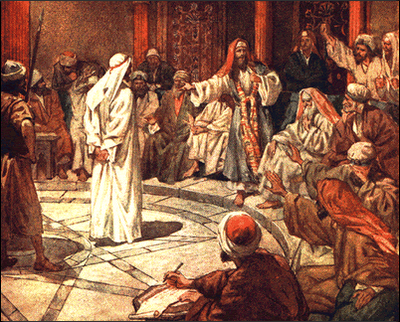TO CHEW ON: "… He chose us in Him before the foundation of the world that we should be holy and without blame before Him in love." Ephesians 1:4
Do you realize that your life's course is old news, a finished story, a foreordained destiny to God? One word the Bible uses to describe this is predestine (predestined/predestination).
[Predestine, from pre - before, and destiny. It means to destine or decree beforehand. Predestined: to foreordain by divine decree or purpose - Funk and Wagnall's Dictionary]
Here are some things the Bible says about His predestination (some other words used to express this concept are election, foreknowledge and foreordained):
1. God has something in mind for each person He created - Proverbs 16:4. For example, Paul explains the fate of Jacob and Esau on the basis of each having a foreordained place in God's plan - Romans 9:11.
2. God's plan of salvation as it unfolded in history with all its characters playing their parts was predestined - Acts 4:27-28.
3. Jesus was "foreordained before the foundation of the world" to be our sacrificial "lamb without blemish and without spot" - 1 Peter 1:18-20.
4. We—Paul's first century readers, down to us Christ followers all these millennia later are chosen, were chosen "before the foundation of the world for holiness" - Ephesians 1:4 (our focus verse).
5. We're called to be changed people, known and predestined to "… be conformed to the image of His Son" - Romans 8:28,29.
6. We're predestined to adoption as Sons by Jesus Christ to Himself - Ephesians 1:5.
7. God has good works planned beforehand for us to accomplish - Ephesians 2:10.
8. Our inheritance is predestined according to His purpose - Ephesians 1:11.
10. The church is part of God's predestined plan and the means, Paul says, to make God's plan known to demons and angels - Ephesians 3:10.
When we try to completely understand the idea of God's predestining of events and lives, we run smack into a wall of human thought limitation. We ask, how can a just God predestine some lives for wicked evil purposes that will take them to a bad end? Isn't that unjust? On the other hand, we ask, how can an omniscient God not know the path that every person will take, the choices they will make?
The way I harmonize the Bible's teaching on God's predestination / foreknowledge / election with His justice is to reflect that as far as I'm concerned I have choices. I am not aware of a Divine Puppet-master, pulling my strings. You too have choices. Everyone on this planet has choices. The choices we make in this life reveal and prove what God knew/knows about us all along—our pre-destiny.
PRAYER: Dear God, thank You for being bigger than my mind can comprehend. May my life today, the way I live and the choices I make, demonstrate that I am Yours. Amen.
*********
Unless otherwise noted all Scripture quotations are taken from the New King James Version®. Copyright © 1982 by Thomas Nelson, Inc. Used by permission. All rights reserved.





















